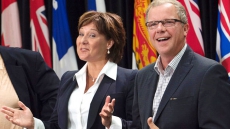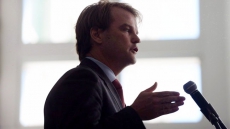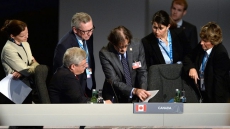VANCOUVER - All summer long, there's been one overriding conversation amongst the hundred-plus employees at a Vancouver financial firm who have school-age children: British Columbia's acrimonious teachers' strike.
Project analyst Robert Ford, with Credential Financial, has a 12-year-old daughter and six-year-old son who won't be starting their school year this Tuesday, and he said the parents at his company all feel the same.
"Fed up," he said. "That's it. No matter what, they want it done. Parents have actually devolved in their opinions to (picking) neither side. Just get 'er done."
Fourteen weeks have passed since B.C.'s more than 40,000 unionized teachers walked off the job in a rotating and then full-scale strike last June, ejecting half-a-million children from classes about two weeks before summer break.
Just a day before the scheduled start of the fall session, there was no indication about when, how or to what extent the conflict will be resolved.
On Saturday, a veteran mediator who spent three days attempting to jumpstart bargaining declared an impasse between the BC Teachers' Federation and BC Public School Employers' Association, the government's bargaining agent. Lead negotiators for both sides acknowledged the new term would be derailed indefinitely.
Many parents and students say they're holding B.C.'s politicians and the teachers' union equally responsible.
"I think it's crazy. There's no reason why it shouldn't be (over). They've had lots and lots of time to negotiate and get a deal done. I don't see why it takes over 16 months to get a contract in place," said Victoria Barker, who recently graduated Grade 12 at Lord Tweedsmuir Secondary in Surrey, B.C.

Now Barker, who concluded high school with less than 12-hours notice, is anxious about the potential impact of the delayed school start on her younger brother and peers in lower grades.
The trigger for the current dispute is usually identified by teachers as a unilateral blow to the collective bargaining process that occurred in 2002. That's when Premier Christy Clark, who was then B.C.'s education minister, introduced legislation that stripped the union's right to bargain class size and composition.
B.C. Supreme Court has since ruled twice that the government's actions were illegal, but inability to get closure on the case, which is under appeal by the government, remains a major sticking point. Wages, benefits and classroom conditions have been the other key obstacles.
But today's bitter standoff is actually backloaded with more than four decades of labour strife in the province's education sector, said a historian who has documented 140 years of the B.C. school system.
Tom Fleming, who wrote the book "Worlds Apart" in 2011 and lead a Royal Commission on Education in 1987-1988, said there's been more than 50 strikes and three lockouts since April 1987.
"We've had this reputation of having very turbulent labour relations," said Fleming, a University of Victoria professor emeritus.
"There's a history of struggle and conflict that is now in the DNA of both sides. The teachers are innately distrustful of government and government is innately distrustful of teachers."
Fleming said the province's public schooling system was peaceful for a century up until 1972, run by a neutral civil service that ensured "nobody ever felt the rough hands of politicians on educational issues."
But then school trustees began setting their sights on politics while a partisan union was built. A recession in the 1980s prompted "restraint" legislation that reduced the number of teachers and teaching assistants by about 2,000 positions, he said.
With a general strike in B.C. appearing imminent, Fleming was appointed in 1987 to helm a commission to bring peace between the teachers and government. But even before the report was out, the government of the day for the first time granted teachers full-scope collective bargaining powers.
"The BCTF stepped up and said, 'Well, we are the true defenders of public education. We will speak for children, we will speak for parents, we will speak for schools,'" Fleming said. "So now you've had since the '80s a battle for hearts and minds over control of school policy."
The union's crusader mentality has brought the downfall of at least two provincial governments, said Fleming, while adding no party has been left untouched.
"They fought with everybody," he said.
"Maybe (the union and the government) like the particular dance they do every year. They've gotten used to doing business this way.
"It's hugely harmful to the community, to the reputation of public schooling. We're looked at as an educational banana republic across this country in terms of our labour relations."
There's only been one contract signed over nearly three decades without a blowout.

The present-day dispute is the culmination of 40 years of battles clouding over the fact B.C. consistently ranks as an internationally top-performing school system, said Jerry Mussio, who spent much of 30 years in the education ministry as a senior bureaucrat.
"You've got these excellent teachers," said Mussio, who has since served as Canada's representative in the development of the OECD Programme for International Student Assessment. "I think that they've been poorly served by both government and by their union."
He said a positive outcome of the past three months of turmoil would be at long last recognition from both sides they must figure out a better way to manage their relationship.
"In terms of the larger picture, getting together and sorting this out so we don't have a repeat of this is crucial," he said. "Otherwise we are going to have a crumbling of the public school system, which is disastrous."





